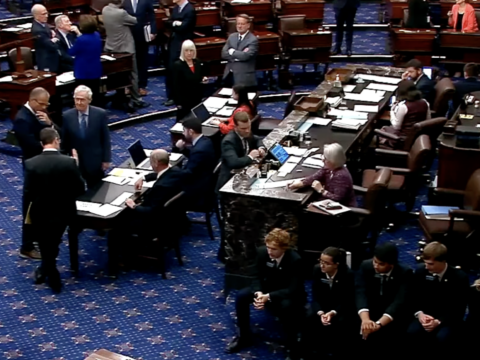WASHINGTON (Diya TV) — The Federal Communications Commission (FCC) has taken a firm stance against the use of artificial intelligence (AI) in robocalls, signaling a crackdown on scams and voter misinformation.
The unanimous ruling specifically targets robocalls utilizing AI voice-cloning tools, thereby reinforcing regulations outlined in the Telephone Consumer Protection Act of 1991. This law aims to curb the proliferation of unsolicited calls, including those featuring artificial or prerecorded voice messages.
The FCC’s action comes in response to recent incidents, such as AI-generated robocalls in New Hampshire, which impersonated President Joe Biden’s voice to dissuade individuals from participating in the state’s primary election.
With immediate effect, the regulation grants the FCC authority to penalize companies employing AI voices in their calls or to block the service providers facilitating such calls. Additionally, it empowers call recipients to pursue legal action against violators, while also providing state attorneys general with additional tools to combat these illicit practices.
FCC Chairwoman Jessica Rosenworcel underscored the necessity of this ruling, highlighting the nefarious activities perpetrated by bad actors through AI-generated robocalls. Rosenworcel emphasized the importance of safeguarding vulnerable individuals from extortion, celebrity impersonations, and voter manipulation tactics orchestrated through such calls.
The FCC’s decision serves as a warning to those engaging in fraudulent activities through AI-powered robocalls, signaling an era of heightened scrutiny and accountability.
Under the regulations set forth by the Telephone Consumer Protection Act, telemarketers are prohibited from employing automated dialers or artificial voice messages to contact individuals without prior consent. The FCC’s ruling extends these prohibitions to encompass AI-generated voices, thereby ensuring consistent enforcement across all forms of unsolicited communication.
Violation of these regulations carries severe penalties, with fines potentially exceeding $23,000 per call. The FCC has previously leveraged these penalties to address instances of robocall interference in elections, including imposing a $5 million fine on individuals disseminating false information in predominantly Black communities.
Furthermore, recipients of unwanted calls retain the right to pursue legal recourse, with the potential to recover damages of up to $1,500 per call under the provisions of the consumer protection law.




